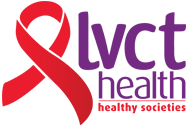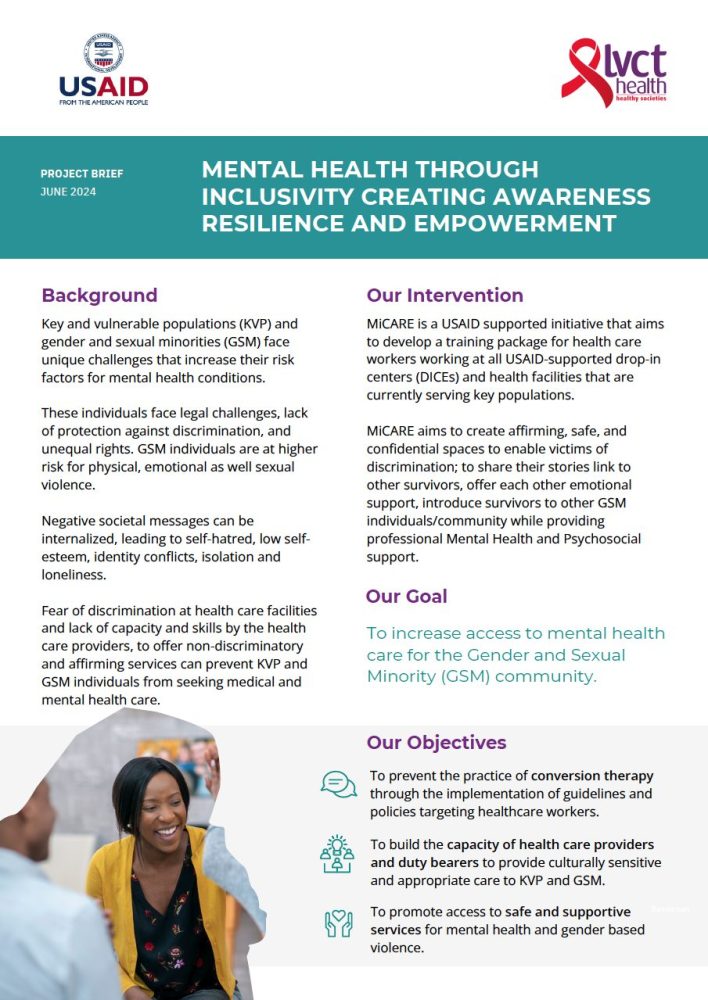USAID MiCARE
Mental Health Through Inclusivity Creating Awareness Resilience and Empowerment
Region: Kenya
Focus Counties in Kenya: 10 USAID-supported counties in Key and Vulnerable Population programs
Funder: Victims of Torture through USAID
Duration: 2023-2025
MiCARE is a USAID-supported initiative that aims to develop a training package for healthcare workers at all USAID-supported drop-in centers (DICEs) and health facilities currently serving key populations. Through the MiCARE project, we seek to create affirming, safe, and confidential spaces to enable victims of discrimination to share their stories, link with other survivors, offer each other emotional support, and introduce survivors to other GSM individuals/communities while providing professional Mental Health and Psychosocial support
Our capacity-building support will focus on non-judgmental, GSM-affirming support, which includes self-exploration, self-identity, and trauma healing.
MiCARE will also facilitate the creation of GSM-affirming, safe, and confidential spaces to enable victims of discrimination to share their stories, link with other survivors, offer each other emotional support, introduce survivors to other GSM individuals and a GSM community, and provide professional Mental Health and Psychosocial support.
Project Goal: Increase access to mental health care for the Gender and Sexual Minority (GSM) community
Our Intervention
- Develop Training Package: With the assistance of GSM community members, peer support networks, and mental health care workers, develop a training package for healthcare workers and community workers.
- Train Health Care Providers: Train Health Care Providers and peer educators in Key Vulnerable Population (KVP) programs on the Mental Health package.
- Build Capacity of Peer Educators: Build the capacity of peer educators to champion Mental Health for Gender and Sexual Minority.
- Safe Spaces: Facilitate the creation of safe spaces for survivors of Gender-Based Violence and those with lived experiences of mental health issues.
- Facilitate Dialogue and Sensitization: Facilitate dialogue and sensitize religious leaders, Faith-Based Organizations (FBOs), traditional healers, state agents, families, and the community for early referral of conversion or violence cases for services.
Project Objectives
Our objectives are to;
- To prevent the practice of conversion therapy through the implementation of guidelines and policies targeting healthcare workers
- To build the capacity of health care providers and duty bearers to provide culturally sensitive and appropriate care to KVP and GSM
To promote access to safe and supportive services for mental health and Gender-Based Violence
Target Counties
MiCARE project works in 10 USAID-supported counties in Key and Vulnerable Population programs (Nairobi, Nakuru, Kisumu, Bungoma, Busia, Kakamega, Meru, Turkana, Mombasa, Kilifi,) which have a total 18 Local Implementing partners, 27 DiCEs and 49 KP integrated Ministry of Health facilities.
Collaborating Partners
- USAID Prevention Team
- NASCOP Prevention Team
- 10 County Health Management Teams (CHMT)
- USAID Fahari ya Jamii
- USAID Tujenge Jamii
- USAID Jamii Tekelezi
- USAID Nuru ya Mtoto
- USAID Dumisha Afya
- USAID Imarisha Jamii
- USAID AMPATH Uzima
- USAID Stawisha Pwani
- KP Consortium
- All USAID KP Local Implementing partners

